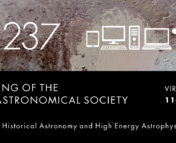This post is part of our series #BlackInAstro. For our cornerstone post, see here. This week, we will be posting a #BlackInAstro story every day for #BlackInAstroWeek. In this installment, we are publishing a post by David Zegeye, a PhD student at the University of Chicago, US.
Twitter: @DavidZegeye
I still remember when I was visiting the University of Chicago’s astronomy department during open house weekend. The University is located on the South Side, a historically Black area of Chicago rich with culture. Specifically, the University is in Hyde Park, one of the few South Side neighborhoods with a large population of white residents. Current students were having lunch with prospective students and we were discussing a range of topics about the astronomy department. One prospective asked a question regarding safety around campus, and current students in unison shifted their tone. In quick succession, almost as though there had been a rehearsed script, students gave vague reasons not to leave Hyde Park, all boiling down to saying don’t go to Black neighborhoods on the South Side because there is nothing valuable there.
I was thinking about this incident when I saw #BlackInTheIvory trending on Twitter, a hashtag started by Joy Melody Woods and Shardé M. Davis as a way for Black students to discuss the racist encounters they’ve had at their university. In my case, UChicago’s ivory towers had overlooked surrounding Black communities, acting as reminders of the efforts the University will take to maintain the segregation of my city.
As astronomers and cosmologists, we seek to understand our present universe and how it has evolved from its primordial conditions. While we are in our offices studying the universe through observations and equations, the universe is also out on our streets. Being from Chicago, my heart always carries the love and pain of my city wherever I exist. We are not separate from the universe, so it’s vital that we seek to understand the history of our land and the people who occupy it.
Chicago is one of the most segregated cities in the country. As with many other tools of racism, segregation is not an accidental process and is instead upheld by institutions that seek to benefit from these divisions. On the South Side in particular, UChicago has historically enforced Hyde Park as a predominantly white neighborhood by actively promoting racially-restrictive covenants. Arnold Hirsch, author of Making the Second Ghetto, wrote that “between 1933 and 1947, the University spent $110,923.72 on “community interests,” $83,597.46 of which was used in defending restrictive covenants.” (p. 145)
Following the end of restrictive covenants, the University would adopt urban renewal practices by seizing land through eminent domain, displacing over 30,000 residents, and significantly expand across Hyde Park and into Woodlawn. UChicago continues its investment in real estate and expanding into Woodlawn and Washington Park and enforcing gentrification. Meanwhile, the University has a police force, which is one of the largest in the country, that has racially profiled Black people and shot at a student experiencing a mental health crisis. At the same time, UChicago upholds the racist narrative of telling students and faculty not to leave Hyde Park and visit surrounding Black neighborhoods.
Although UChicago has been one of the worst preparators of systematic racism in the city, it has not been the only academic institution to do so. From Columbia and Harlem, to Yale and New Haven, to UPenn and West Philadelphia, academic institutions have consistently shown how invested they are in maintaining community control. When I say UChicago was not built for me, I am saying the University has directly harmed my people. In this light, ivory towers are a symbol that we are expendable if we are in the way of the University’s expansion efforts.
I’ve been told to ignore concerns outside of academia and instead focus on my research, and seen those same people chanting Black Lives Matter. If I am being told to leave my identity and culture at the door, do you see my Blackness as having value only because I am getting a PhD? The love for my people and home is how I first got interested in understanding our origins. My passion for understanding the cosmos would have existed regardless if I pursued a degree, and there are so many others in my community who are just as curious about understanding our universe.
I am frustrated that many of my peers are comfortable traveling all the way to the South Pole but won’t travel a few blocks to visit the rest of the South Side. Us and our communities shouldn’t matter because of our value to institutions and capital. This is antithetical to saying Black Lives Matter. Academics must fight for Black people in and outside of their department. Understand the history of your land, your institution, organize outside of your department, and fight to abolish the conditions and structures that uphold racism.
I would like to thank Ashley Walker, who started #BlackInAstro, KeShawn Ivory, and Cheyenne Polius for sharing their stories and giving me the courage to share mine. I would also like to thank Juliet Eldred for her class project “Let Our Impact Grow From More to More” on detailing the history of UChicago’s land use and expansion.




Thank you, David, for this motivating post.